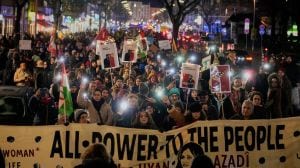Avoid the US trap
With the Kargil conflict on and in the face of the threat to national security, political parties were expected to function as a united v...

With the Kargil conflict on and in the face of the threat to national security, political parties were expected to function as a united voice against the foreign incursion. But, leopards do not change their spots.
Thus, though the Vajpayee government is a caretaker and allowed to continue under the constitutional imperative of a government at the Centre, it is misusing its position to obtain an exclusive opportunity to refurbish its image. The demand for calling a Rajya Sabha session from all sections of the people is being evaded on the plea that discussions will demoralise the army.
It is true that, unless the Congress and other opposition parties show a greater sense of self-restraint and responsibility, the session may turn out to be an exercise in mudslinging. But, democratic functioning demands it. Such a session will also enable the people to make their own assessment of the maturity of each political party.
Moreover, none will emerge clean out of this mudslinging. If the Vajpayee government has to answer for the intelligence failure and a certain degree of unpreparedness, the responsibility for the inadequacies of ammunition and essential equipment would have to be borne by the Congress and the United Frontgovernments of the past.
Of course, it is for the present government to take initiative in creating proper conditions for a democratic response to the question. It must do by forming a mechanism like the National Emergency Security Council consisting of all parties to deal with Kargil and related matters like an immediate response to US envoy Gibson Lanpher. Kargil is not a party issue 8212; it concerns the integrity of the nation.
The government seems to be suffering from uncalled-for euphoria, reading too much into the approach of the USA 8212; and G-8 which has not even mamed Pakistan in its resolution 8212; in asking for the Line of Control to be honoured. It is being inferred from this approach that Pakistan is now internationally isolated. If the US was serious about insisting on disengagement of Pakistani regulars and intruders from Kargil, it could have forced the Pakistani army to do so immediately.
Its soft approach is a continuation of a well-thought-out strategy to create for itself a permanentpresence in the subcontinent and Kashmir to meet its geopolitical requirement. Such a thinking had been publicly canvassed under the cover of the Kashmir Study Group which had obvious links with the US government.
The group suggested that a portion of the former princely state of Jamp;K be reconstituted as a sovereign entity and that the sovereignty of the new entity would be guaranteed not only by India and Pakistan but by appropriate international bodies. Who else but the US with its clout in a unipolar world will usurp the right to take decisions on behalf of the international community?
Though India has already agreed to talk on the Kashmir issue, insistence by Pakistan on a time-bound agreement will necessarily bring about the US involvement. The specious plea will be that, as India and Pakistan have not arrived at an agreement, there is a danger of nuclear war, posing a threat to the rest of the world also. It is in this context that the American media projection of a possible Pakistani resort to anuclear strike has to be viewed. The Washington Post has already come out with the suggestion that, if Pakistan is forced to withdraw from the LoC without a corresponding advantage, the Pakistani army may resort to a nuclear strike. Thus, a fear psychosis is being created in order to justify US intervention.
But, however dangerously irresponsible the Pakistani army may be, even it cannot resort to the nuclear option, knowing full well the disastrous consequences for both the countries. The talk of a nuclear strike by Pakistan has to be put in the same category as the maniacal suggestion by a RSS mouthpiece that India should consider the nuclear option to teach Pakistan a lesson.
The RSS ignores that the only result of such madcap suggestions would be to make it easier for the US to justify its intervention and thus internationalise the Kashmir issue. Even India8217;s suggestion of US sanctions against Pakistan for Kargil aggression may provide an indirect handle to the US to try and intervene in thebilateral Kashmir dispute.
In this context, not-withstanding the chest-thumping by the government that the US is totally with India, Bill Clinton8217;s immediate yes8217; to the meeting requested by Nawaz Sharif cannot be brushed aside as of no consequence. The real aim of this meeting would need to be watched.
A proper answer to all these problems cannot be satisfactorily given by a caretaker government. That is why it is an urgent necessity to constitute a National Emergency Security Council consisting of all the political parties, which should evolve a consensual response to the various suggestions being put forth by the US and others. This council should continue till the Lok Sabha elections to avoid party politics being brought in and thus impeding the defence priorities.
The credit for success in the Kargil conflict, or the blame for any temporary setbacks, must be shared by all the political parties. The council will be responsible for evolving a consensus on the situation. Thus it will give anassurance to the armed forces that the whole of the nation stands united behind them and salutes their bravery.
Let the parties shout against each other on the political part of their manifestoes. But, let not the defence and the integrity of the country be made a football of politics.
The question of postponement of elections is now a closed chapter after the announcement by the Election Commission that elections will be held as per schedule. But if, unfortunately because of some unforeseen developments, the possibility of a declaration of emergency arises, it may not pose a formidable constitutional hurdle.
In my view, it is possible to give a harmonious interpretation to Article 352 read with Article 83 of the Constitution. But, in that eventuality, the decision cannot be of the government alone but it will have to be consciously and specifically approved by all the major political parties.
Only then can the Election Commission agree to postpone the election and the President to authorise it. It istrue that for any delay in holding the election, the opposition too has to take the blame. But that is no justification for allowing the Vajpayee government alone to continue for a longer period. The problems of defence and security of the country mandatorily require the full participation in the government by all major political parties.
The writer is a former Chief Justice of the Delhi High Court
- 01
- 02
- 03
- 04
- 05































